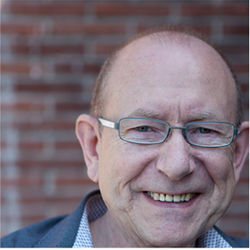Difference between revisions of "Ruiter, Wim de"
| Line 4: | Line 4: | ||
Born: August 11, 1943<br /> | Born: August 11, 1943<br /> | ||
| − | + | Died: 26 August 2017 <br /> | |
| + | |||
Country: Netherlands, Heemstede, Holland <br /> | Country: Netherlands, Heemstede, Holland <br /> | ||
| Line 15: | Line 16: | ||
-------------------------------------------- | -------------------------------------------- | ||
| − | + | An unwavering curiosity about new musical horizons. The entire post-war music history is heard in the compositions of Wim de Ruiter. In the sixties and seventies, Wim de Ruiter took a fresh look at the acquired tradition and experimented with twelve-tone techniques and serialism. From the eighties De Ruiter is looking for a much more personal idiom and in his own way he also draws inspiration from old music / polyphony, microtonality, the new tonality and electronic music. De Ruiter is fascinated by the theatrical effect of music and always looks for special timbres and effects. In addition to his composer career, De Ruiter has always been active in music management, including that of the Donemus Foundation, Geneco and the Haarlem International Organ Festival. and as a teacher at the conservatories of Amsterdam and Zwolle. In addition, he is the founder of the Conlon foundation that works for the use of electronically controlled acoustic instruments. <ref>https://webshop.donemus.nl/action/front/composer/Ruiter%2C+Wim+de</ref> | |
| − | |||
<!--== Books for Percussion == | <!--== Books for Percussion == | ||
Latest revision as of 19:16, 24 July 2018
Biography
Born: August 11, 1943
Died: 26 August 2017
Country: Netherlands, Heemstede, Holland
Studies:
Teachers: Piet Kee, Ton de Leeuw
Website:
An unwavering curiosity about new musical horizons. The entire post-war music history is heard in the compositions of Wim de Ruiter. In the sixties and seventies, Wim de Ruiter took a fresh look at the acquired tradition and experimented with twelve-tone techniques and serialism. From the eighties De Ruiter is looking for a much more personal idiom and in his own way he also draws inspiration from old music / polyphony, microtonality, the new tonality and electronic music. De Ruiter is fascinated by the theatrical effect of music and always looks for special timbres and effects. In addition to his composer career, De Ruiter has always been active in music management, including that of the Donemus Foundation, Geneco and the Haarlem International Organ Festival. and as a teacher at the conservatories of Amsterdam and Zwolle. In addition, he is the founder of the Conlon foundation that works for the use of electronically controlled acoustic instruments. [1]
Works for Percussion
Sonate - Percussion Duo, Bass Clarinet, Piano
Variaties - Mallets - (Mar/Vibes); Bass Clarinet
References
